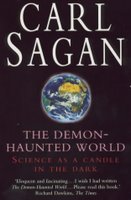 If there is one dictum that fully expresses what this book is about, it is the Latin proverb, Ubi dubium ibi lebertas: “Where there is doubt, there is freedom”. This proverb appears as a header to one of the chapters of the book and I think it encapsulates, in a nutshell, Carl Sagan’s philosophy of thought.
If there is one dictum that fully expresses what this book is about, it is the Latin proverb, Ubi dubium ibi lebertas: “Where there is doubt, there is freedom”. This proverb appears as a header to one of the chapters of the book and I think it encapsulates, in a nutshell, Carl Sagan’s philosophy of thought.
Basically, Sagan argues that (1) scientific literacy and critical thought are vital for the success of any democratic society; (2) the scientific method is presently the best method that we have to determine some sort of provisional truth that we can work with; (3) science is successful due to the error-correcting machinery present in its method; and (4) democracy is a good social system of governance as it also contains error-correcting attributes.
Sagan highlights the dangers of, and presents some very convincing arguments against, the claims of fortune-tellers, clairvoyants, astrologers, faith healers and alien abductees. One of the central aims of the book is to debunk these pseudoscientific beliefs, as well as to highlight the differences between pseudoscience and real science:
Science thrives on errors, cutting them away one by one. False conclusions are drawn all the time, but they are drawn tentatively . . . A succession of alternative hypotheses is confronted by experiment and observation. Science gropes and staggers towards improved understanding . . . Pseudoscience is just the opposite. Hypotheses are often framed precisely so they are invulnerable to any experiment that offers a prospect of disproof . . . Practitioners are defensive and wary. Sceptical scrutiny is opposed. When the pseudoscientific hypothesis fails to catch fire with scientists, conspiracies to suppress it are deduced. (pg 25)
The book is also useful as it provides invaluable information on critical thought. The chapter titled ‘The Fine Art of Baloney Detection’ provides some tips on how to spot spurious arguments and false claims made by television adverts, politicians, astrologers and the like.
One thing bothered me though. As an indication of the decline of critical thought in society, Sagan lists various television programmes. For example, he criticizes Star Trek for misinterpreting the theory of evolution, and X-Files for presenting a half-baked idea of critical thought. I found his criticism of television programmes a bit tiring; it reminded me of those little old ladies at my childhood church who would complain for hours about television and how it was corrupting the minds of children.
I must admit that I really liked The Demon-Haunted World. All in all, a good book with good arguments against superstition and pseudoscience, although Sagan’s intermittent doomsday tone got to me somewhat.
 A fictional dialogue, continued from Part 1.
A fictional dialogue, continued from Part 1.
Evangelist: But you don’t know what you are talking about. The joy that we will feel in heaven will be way more than anything that you have ever experienced.
Kevin: Do you have family members or close friends who are not saved?
E: I do. But I trust that God will soften their hearts to accept his message of salvation.
K: Do you love them?
E: Of course! That is why I pray for them all the time.
K: But if they don’t accept Jesus before they die, they will go to hell, right?
E: It hurts me deeply to think about it, but yes. Romans 3:23 says that all have fallen short of the kingdom, and John 3:16 says that the only way to heaven is through Jesus. It is their own free-willed choice to reject Jesus.
K: Tell me, would you still feel hurt when in heaven? I mean, would you still feel sadness or sorrow over your family members and friends who did not accept Jesus, and who are suffering in hell?
E: One would think so. But as I said before, the Bible says that I will feel no sorrow in heaven.
K: So you won’t feel any sadness for them when you enter heaven?
E: The Bible says no, so I don’t think I will.
K: You see, this is what also bugs me about the whole heaven thing. Despite the fact that your friends and family will be experiencing a great deal of pain, you will feel nothing for them. How can you know of their suffering but not feel any sorrow?
E: I read this article by the Christian philosopher, Peter Kreeft, and under point 7 he suggests that our memories regarding the unsaved will be erased when we enter heaven.
K: (stunned silence)
E: We will not remember memories that bring about sadness or sorrow.
K: So you won't even remember your own friends and family members who you loved in this life, and who chose against Jesus?
E: If you read Isaiah 65:16-17 and Revelation 21:4, this is what I think the Bible says. Thinking about the lost naturally brings about feelings of sadness and sorrow, but in heaven we won’t be able to think about such thoughts, because there will be no sorrow at all.
K: So not only will we not have the capacity to feel empathy or compassion, but our memories will also be erased? To me, your version of heaven sounds like some form of mental lobotomy.
To be continued . . .
One of the reasons why I left Christianity is that, as a Christian, I got tired of employing what I perceived as double standards when choosing what to believe. I will explain with the following analogy.
Imagine if we mix a group of atheists and conservative Christians in a lecture room, and a speaker comes in and claims that she/he had witnessed a dog speaking English. Would everyone in the audience believe that claim? I would imagine that both atheist and Christian listeners would immediately be skeptical, and both groups might request some form of evidence from the speaker. Why?
Well, firstly, the talking dog claim is inconsistent with our personal experience of dogs. Each of us, during our lives, have probably interacted thousands of times with our furry friends, but not one of those experiences involved a dog that could actually recite Shakespeare. Second, if we read some veterinary journals, we learn that the larynx, mouth and brain of a dog are not adequate or complex enough to formulate human speech. In other words, the talking dog claim is inconsistent with our current knowledge of how the world generally seems to work. So until very good evidence is brought forward, we withhold belief in the speaker’s claim. This only seems rational, right?
The reason why I started to doubt Christianity is that I suddenly realised that although both Christian and atheist in this hypothetical lecture room would react with natural skeptism towards the talking dog claim, the Christian is the one who might not be skeptical of, and even might defend, a 3400 year old manuscript’s claim that a donkey once spoke (Numbers 22:28-30). Is this not inconsistent?
Christianity makes a whole lot of incredible claims. It makes the claim that humans have souls and that there is life after death; that spiritual beings called demons and angles, which we cannot see, wage war in the world around us; that the saviour of our world - the son of God, born of a virgin - was sent to earth, died and raised from the dead; that the red sea was parted; that the sun stood still for a day; that all other faith systems, thousands of them throughout history, systems that have been followed by millions, are basically false (John 14:6); that the relatively young religion of Christianity is the ultimate truth and thus contains the ultimate meaning of life and the universe in which we live.
All these claims contradict much of what we presently know about the world and much of what we have experienced as individuals. How can an atheist be blamed for not believing these claims? After all, when evaluating the two similar claims of the talking dog and the talking donkey, the atheist is simply being consistent.
A struggling Christian kneels . . .
Dear God
I still often wonder if you are out there. I remember that I often used to look up at the stars at night and stare at the breath-taking wonder of the universe, and I just knew, deep down inside, that you existed. I remember the times I used to speak to you, and some of those times I really thought I felt your presence, and I just knew, deep down inside, that you were there.
But I’m sorry to say that I’m not so certain anymore. I have learnt that, on its own, just knowing that something is true, deep down inside, does not mean that it is. I will keep on searching, but I also need you to do your part. If you do exist, and if you are a God who wants to have a personal relationship with me, I want you to let me know. But God, I do not want you to appeal to my heart - I need you to appeal to my mind first.
I hope that one day I will join you again, and be certain that our relationship is true. I hope that I will be able to find you. But until then, this will be my final prayer. I hope for, and look forward to, your response.
Amen
an ex-Christian stands up . . .
 If there is one dictum that fully expresses what this book is about, it is the Latin proverb, Ubi dubium ibi lebertas: “Where there is doubt, there is freedom”. This proverb appears as a header to one of the chapters of the book and I think it encapsulates, in a nutshell, Carl Sagan’s philosophy of thought.
If there is one dictum that fully expresses what this book is about, it is the Latin proverb, Ubi dubium ibi lebertas: “Where there is doubt, there is freedom”. This proverb appears as a header to one of the chapters of the book and I think it encapsulates, in a nutshell, Carl Sagan’s philosophy of thought.
